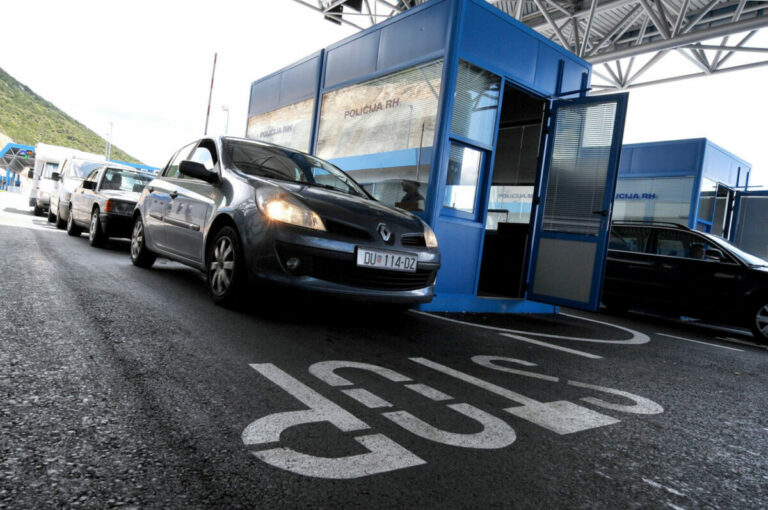
EU Council formally challenges Austria’s veto of Schengen decision over environmental problems caused by long truck queues; The case could reach EU Court of Justice
The General Secretariat of the Council of the EU has published the request of an association founded by former minister Razvan Nicolesc to review on environmental grounds the decision to postpone Romania’s Schengen accession. The EU Council now has 60 days to decide either to reject the request or to approve and schedule a new vote on Schengen, Nicolescu said. In the event of a rejection, he announced that he would open a case at the EU Court of Justice (CJEU).
„We are aware that the General Secretariat of the Council of the EU has published our request for a review of the decision to postpone Romania’s accession to the Schengen area. The request was made on the basis of the Aarhus Convention and takes into account the fact that on 8 December 2022 the JHA Council did not take environmental aspects into account when deciding not to join Schengen. We are in a climate crisis that has become, according to UN reports, the main source of migration. Last week was the hottest on record. We do not have the luxury of allowing tens of thousands of tonnes of carbon dioxide to be produced by trucks waiting at customs because of an Austrian Chancellor who has decided that he no longer wants to abide by the EU treaties. I publicly call on the EU Council experts to continue to treat our request seriously in order to avoid a trial at the Court of Justice of the European Union. We are talking about the most important issue on the EU’s agenda: fighting climate change,” Răzvan Nicolescu told G4Media.
The request to the EU Council was filed by the NGO Association for Clean Energy and Climate Change. The association is led by Răzvan Nicolescu, former Energy Minister and former President of the EU Energy Regulatory Authority (ACER).
What will happen if the EU Council, which brings together representatives of member states, rejects the application or gives a negative response? „We will open an action against the EU Council at the CJEU arguing that the vote in the JHA Council on 8 December 2022 did not take into account the environmental impact,” Nicolescu said.
The EU Council is now led by Spain, which has declared itself a supporter of Romania and Bulgaria joining Schengen. The vote in the Council must be unanimous. Austria now opposes the entry of both countries, and the Netherlands opposes Bulgaria’s accession.
The application submitted by the association to the EU Council is based on the provisions of the Aarhus Convention which is based on the recognition of the right of every person of the present and future generations to enjoy an environment adequate to his or her well-being and health.
The Aarhus Convention is a multilateral agreement that aims to guarantee the rights of citizens regarding access to information, access to public participation and access to justice in environmental matters. The Convention entered into force in 2001 and has all 27 EU Member States as signatories. At EU level, the obligations of the Convention are implemented by Regulation 1367/2006, known as the Aarhus Regulation.
The application to the EU Council claims that Austria did not take into account the environmental impact when vetoing Romania and Bulgaria’s accession to Schengen.
A March 2023 report by the consultancy KPMG, cited in a submission by the Association for Clean Energy and Climate Change, shows that an estimated 46,000 tonnes of CO2 per year are emitted by road vehicles while waiting at border control as a result of the postponement of Romania and Bulgaria’s Schengen admission.
The report shows that more than 311,000 thousand mature trees are needed to capture the carbon emissions associated with waiting at the border.
One area affected by the postponement of Romania and Bulgaria’s Schengen accession is the negative environmental impact of continued border controls due to CO2 emissions from vehicles waiting to cross the border and be processed and whose engines are left running.
KPMG in Romania carried out an analysis to quantify what this impact is and its negative effects on the EU’s environmental objectives.
The research involved calculating carbon emissions over a one-year period from road vehicles waiting to cross the borders between Romania and Bulgaria, Romania and Hungary and Bulgaria and Greece. The data was based on the number of vehicles crossing, vehicle types and average waiting time. To collect the primary data, KPMG specialists sent requests for information to relevant public institutions in Romania, Bulgaria and Greece, as well as to private organisations.
The Association for Clean Energy and Climate Change submitted a petition to the European Parliament’s Petitions Committee in March asking for legal intervention in Romania’s Schengen accession process. The European Parliament adopted a resolution based on this petition by a large majority.
Urmărește mai jos producțiile video ale G4Media:

Donează lunar pentru susținerea proiectului G4Media
Donează suma dorită pentru susținerea proiectului G4Media
CONT LEI: RO89RZBR0000060019874867
Deschis la Raiffeisen Bank